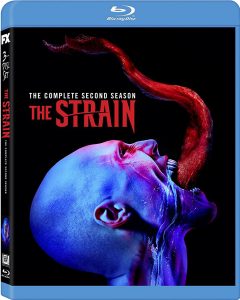A couple seasons ago on “The Walking Dead,” Rick and the gang agree to march toward Washington, D.C., on Eugene’s promise that there was a governmental structure in place working against the zombie plague. While the characters never spoke in-depth about the question of whether the government – which demonstrably failed to stop the zombie plague — should be trusted, I felt strongly that once the gang got to D.C., they would not find a safe government-run utopia.
The twist came earlier than I expected when it turned out Eugene was making the whole thing up for the sake of having a purpose in life, and the government’s actual role in the post-apocalyptic world, if any, has remained a mystery through five seasons. But now the spinoff/prequel “Fear the Walking Dead” is shedding some light. In the fourth episode, the military men haul off Griselda, with her damaged foot, and Nick, with his drug addiction, in decidedly violent and underhanded fashion. They break their promise that Griselda’s husband, Daniel, can come along for the surgery. And in the case of Nick, he needed medication, not a hospital trip at gunpoint.
So what is the government’s nefarious goal?, a viewer is tempted to ask. Did something go wrong with secret medical experiments? Has the United States been taken over by madmen who want to see walkers rule the world? The answer, I think, is simpler: The soldiers and their unseen bosses on “Fear the Walking Dead” are exercising power for power’s sake (and many of the lower-ranking soldiers are kept in line due to the allure and continually stressed importance of following orders). Lieutenant Moyers, casually using a recently ruined neighborhood as a golf driving range, says it’s not his job to tell frightened wives where their husbands have been hauled off to – that’s a job for social workers. As he tells this to Travis, it’s clear from the look in Moyers’ eyes that he enjoys power, and no explanation is needed beyond that.
I saw a similar look from a young man who visited the Libertarian Party booth I was manning at the Missouri State Fair a few years ago. We gave visitors the World’s Smallest Political Quiz, which plots people’s political views on a diamond-shaped graph. The goal is to demonstrate that most people lean toward liberty – the top of the diamond — in their hearts and minds. But there were some exceptions; this young man plotted firmly on the bottom of the diamond, in the totalitarian grid. I was momentarily surprised, but one look in his eyes was explanation enough: This man believed in power and law and order and might makes right — and that was both the start and the end of the debate.

When debating the dangers of giving special powers to a special group, the obvious example is the rise of the Nazis, but that’s also a bad arguing tactic due to Godwin’s Law – invoking the Nazis ends the argument at a stalemate because it’s the most extreme example. Still, TV dramas can get away with Nazi stories (indeed, they’ve long made ideal, controversy-free villains), and “The Strain”powerfully (no pun intended) tells of Thomas Eichorst’s rise from bad salesman to strutting SS man in Sunday’s episode. We see Eichorst marching through town in crisp regalia, being saluted by his uneasy former boss; not far away, a family of lynched Jews hangs from tree limbs in broad daylight.
While “The Strain” obviously skipped over some transitional scenes for the sake of a concise backstory, that made the message stronger in a way. As Daniel – sort of a practical Yoda figure — says on “Fear the Walking Dead,” “When it happens, it happens fast.” Whether he’s referring to a full-on police state or an apocalypse, it holds true either way.
Using Nazis as villains is nothing new, but at no point did the writers hedge their bets by showing how extreme Nazis are compared to other political movements: Eichorst’s story is simply about a man who desires power and finds it through government. But “Fear the Walking Dead” is more remarkable, because it is portraying U.S. police officers and American soldiers as villains (hapless in the former case, power-hungry in the latter case) – and just as invoking Nazis usually stalemates an argument, so does criticizing police or the U.S. military. Yet “Fear the Walking Dead” just went there.
Perhaps even more powerfully than the cold hard facts about the militarization of police in recent years (see Eric Garner, Kelly Thomas, Walter Scott, Baby Bou Bou, highway patrol checkpoints, etc.) is the fact that Hollywood is now addressing this national problem through its fiction – and that it happens to be end-of-the-world-as-we-know-it fiction is not something to be brushed off, either. Hollywood is one of the most casually and consistently statist enclaves in America, and while it’s true that stories with all political viewpoints come out of Tinseltown (that’s just good business sense), the bluntness of these anti-institution stories on two fairly mainstream shows is remarkable.
It should also be noted that humans value life in 2015 more than at any time in history – that’s why, even though we’ve allowed the police state to emerge, people of all political beliefs are also concerned by that fact. Nazis could hang Jews in the open without an immediate citizens’ revolt in the 1930s, but such a brazen display would not happen today, at least not in the Western world. But the allure of power (see Donald Trump, who has money and fame and now seeks to complete the trifecta) and the desire to be ruled (see passionate supporters of Trump and other mainstream candidates) are also common human traits, as they always have been.
On “Fear the Walking Dead” and “The Strain,” the writers have not invoked conspiracies or medical experiments gone awry, as much as we might suspect those explanations are lurking around the corner. The villains want power because they want power. That’s a powerful message, especially coming from Hollywood.


